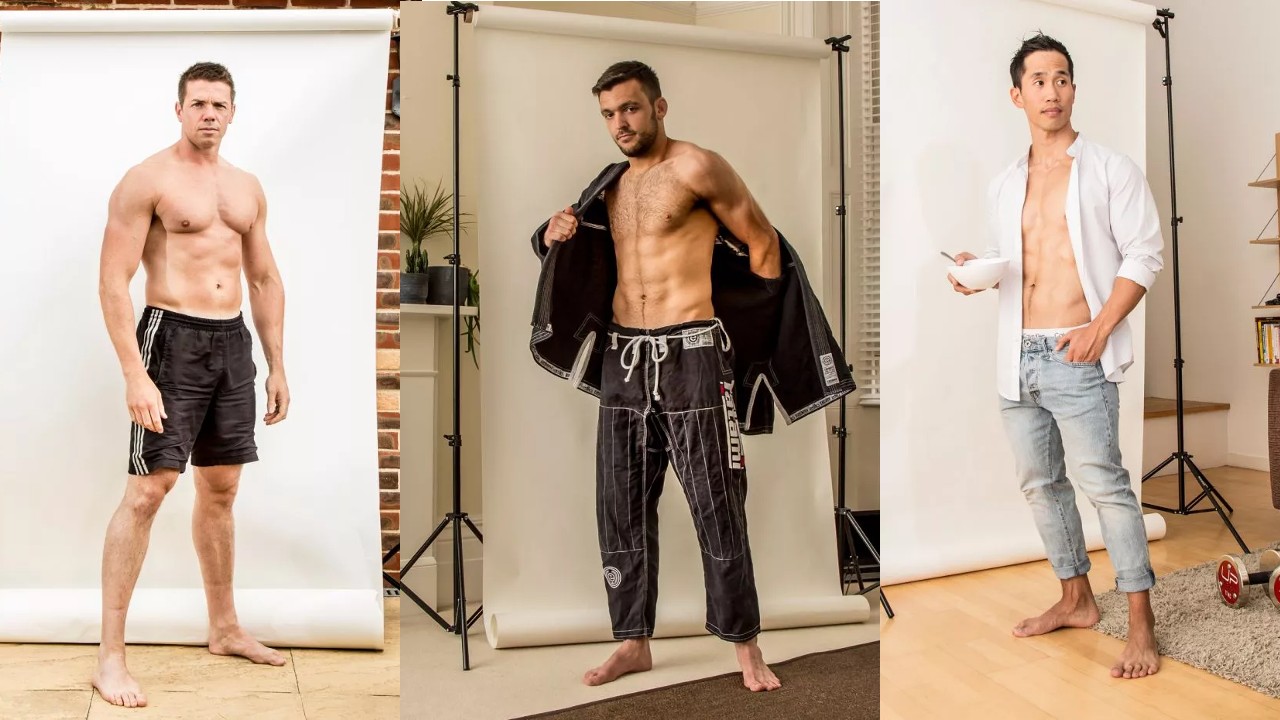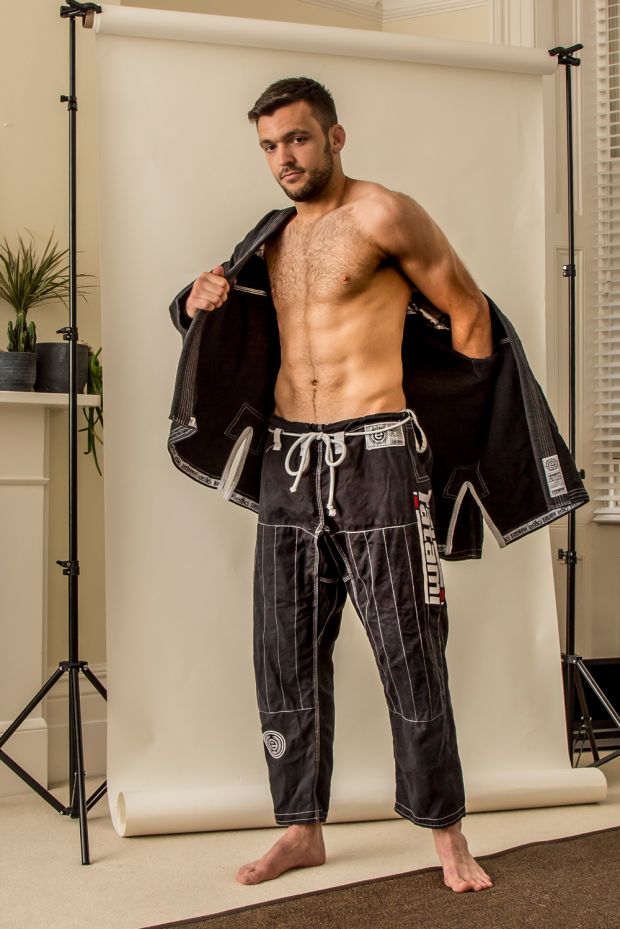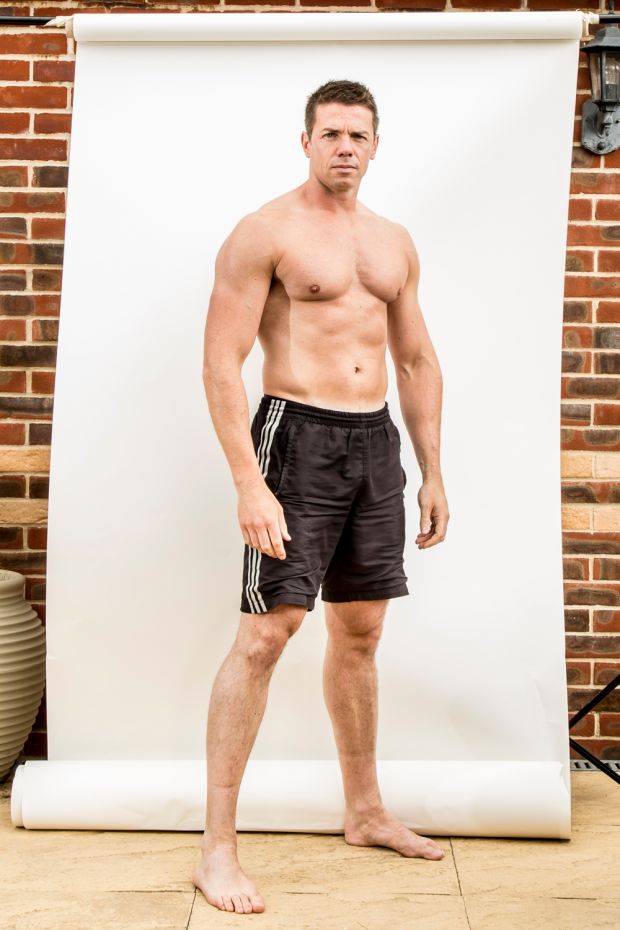
Tony Hambos, 30, mechanical engineer, Brighton

How much exercise do you do in a typical week?
I only actually go the gym once a week. I spend most of my free time doing Brazilian jiu-jitsu [BJJ], which is a grappling-based martial art that a lot of MMA fighters use in the UFC. I’ve been doing it for nearly seven years, and I’m completely addicted to it. Most weeks I’ll do five BJJ classes, each lasting between 90 and120 minutes, plus one weightlifting session in the gym and two cardio workouts such as running or swimming.
RECOMMENDED: How to Get a Six Pack
How do you fit all of that in?
I work shift patterns, so I’ll do four days of early starts, have two days off, then do four days working nights. The BJJ school where I train always does two classes per day, so whatever shift pattern I’m on, there’s always a class I can make. It gives me something to look forward to while I’m at work.
Have you always been into fitness?
I used to play football and go to the gym two or three times a week, just to try to look good as most guys do, but it never made a huge difference. Then I started BJJ, and it gave me the motivation to train far more often and stick to a disciplined diet, and I saw dramatic changes in a matter of months.
What effect has it had on your physique?
Now I’ve got an athletic figure, like a sprinter, with upper body muscle and a six-pack, but none of the bulkiness you get from lifting weights all the time, which is a good thing. It’s a by-product of spending so much time doing such a physical sport.
Why do you think that’s a good thing?
If you’re working out every day purely to sculpt your body, it gives off a certain vibe, which isn’t necessarily that attractive. Even as a guy, you can notice it with other guys in terms of their physique and mentality, like men who want abs to look good on the beach – you can tell that’s their priority. Looking good is a real confidence booster, and my girlfriend likes the fact that I’ve got a six-pack all the time, but I would never go out of my way to get one if it meant compromising my BJJ training.
Do you follow a specific approach to nutrition?
I stick to a wholefood diet and try to cut out sugar and processed carbs as they make me feel physically and mentally sluggish – not to mention fat. I try to eat protein with every meal, but I don’t count calories, I eat the amount that makes me feel good. But if I’ve got a tournament coming up, I’ll cut out nearly all carbs, sugar and alcohol. In BJJ you compete in specific weight categories, and I generally have to lose around 4kg to make the 76kg lightweight limit.
Sign up for workout ideas, training advice, reviews of the latest gear and more.
RECOMMENDED: Six-Pack Diet
What does your body look like then?
By the time I’m ready to fight my abs are completely shredded – it almost looks as if my skin’s being stretched out over my muscles, which is crazy. But as with everything else, it’s something I do purely for sports performance, rather than aesthetics.
Charlie Burton, 43, forex trader, Newbury

How much exercise do you do in a typical week?
I lift weights at the gym four times a week, splitting the sessions up by body part. A lot of guys get carried away focusing on their abs, but for me legs are crucial: they’re the biggest muscle group in your body, and training them gives you a massive testosterone boost, which helps you build muscle everywhere, including your abs. I spend a whole session every week on legs, based around big compound exercises such as squats. In addition to the gym, I go running once a week, and on Saturdays I do a group CrossFit class. Having that extra bit of variety helps to keep it fun and keep me motivated.
RECOMMENDED: Abs Circuits for the Gym
Have you always trained this hard?
I’ve always been into sports and in my twenties I did a lot of karate, but I ended up with back problems because of it. I started going to the gym to strengthen and protect my back, and I’ve been going ever since.
How has your physique changed since then?
If anything, I look better now than I did in my mid-twenties. I’m definitely more muscular from lifting weights, but I’ve always been fairly lean. I sit at around 11% body fat most of the time, so I’ve always got a visible six-pack. It’s not super defined, but it’s there.
Is having a six-pack one of your main priorities?
I train because I enjoy it rather than working out purely for aesthetic purposes. I want to be mobile and able to do things when I’m old. If I suddenly had to get up and run two miles, I could, and that’s far more important than body fat percentage. But I do like to get as ripped as possible now and again just for a challenge, and having a goal really helps.
How far have you taken it?
A couple of years ago I managed to get down to 3% body fat, and my abs were completely shredded. It was great to see what I could do with my body, especially since I was in my forties. But to get that lean takes a lot of extra work, and I had to spend a month or two not drinking alcohol at all, which is a sacrifice I can’t be bothered with most of the time. Plus, it’s hard to do it without losing a bit of muscle mass and my wife prefers me looking a little bulkier, even if it does mean that my six-pack isn’t quite as defined.
How much do you drink now?
I’ll have a drink at the weekends, but I’m pretty strict during the week. It can be tricky turning down drinks from your mates – but I can handle it. If you want to get a six-pack, cutting down your alcohol intake will make a huge difference.
Andrew Cheung, 33, graphic designer, Manchester

How much exercise do you do in a typical week?
I go to the gym four days a week, usually on a Monday, Tuesday, Thursday and Friday. I like to train after work in the evenings – I’m not a morning person at all. Plus, I use working out as a reward system because it gives me something to look forward to at the end of a stressful working day.
Have you always been this active?
I wasn’t athletically gifted as a kid and I’m not genetically blessed with big muscles. I started going to the gym in my mid-twenties because my waistline had jumped from 29 to 35 inches and my family has a history of diabetes and high blood pressure. I was also a bit introverted and figured that if I looked good then people would be more likely to approach me, so there was a confidence element to it.
How long was it before you saw any results?
I struggled for the first few years, mainly because I would jump around between different training plans and because I didn’t commit myself fully to healthy eating, which is around 80% of the battle.
What changed?
My girlfriend bought me a 12-week transformation book, and it became my bible. I decided to just tune everything else out for those three months and dedicate myself to it. The results were incredible: I put on loads of muscle and got completely ripped – it was the first time in my life I’d ever had a six-pack.
Do you maintain that regime now?
I still push myself as hard in the gym because I’d feel like I was wasting my time if I didn’t. With my diet, I’m disciplined during the week – I always eat plenty of protein, save carbohydrates for after my workouts and avoid processed junk foods – but I’m more relaxed at weekends. At the end of the day,
I like being in shape and having abs, but I won’t become a slave to process. I love food too much, and it’s an important part of my family and social life.
What motivates you to be so disciplined?
Initially, it was all very superficial and physique based, but these days I’m more focused on my long-term health – I want to be an active person when I’m old. My grandmother would walk two or three miles to visit our house every day when she was in her nineties, so she’s my inspiration.
Between 2010 and 2016, Ben was the deputy editor of Men’s Fitness UK, which predated, and then shared a website with, Coach. Ben also contributed exclusive features to Coach on topics such as football drills, triathlon training plans and healthy eating.

